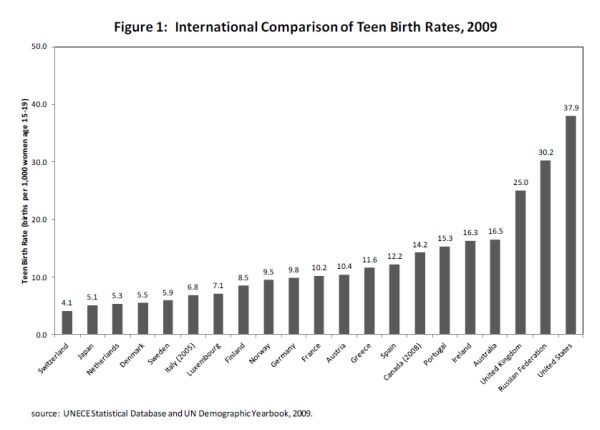Yesterday I mentioned America's declining teen birth rates and wondered how that improvement squares with the cries of moral decline that we hear from our alarmist right-wing neighbors.
That improvement is relative. Compare birth rates in the U.S. with our international neighbors:

Our teen birth rate is 50% higher than back in the U.K. It's 150% higher than across the border in Canada (so much for any hypotheses about cold weather promoting naked snuggling). And over in godless, socialist Scandinavia, the teen birth rate is in the single digits per 1,000 girls, versus America's rate in the 30's per thousand.
Want to know one form of immorality that correlates with a high teen birth rate? Try economic immorality, in the form of income inequality:
In a new working paper, Kearney and Levine looked at international differences in birth rates, as well as variations among American states. There are widespread differences in rates: New Hampshire's stands at 16.4 births per 1,000 teens, while Mississippi's is 64.4. The researchers found a state's level of economic inequality to be a significant influence in the birth rates. All other things being equal, "teens in the highest-inequality states are roughly 5 percentage points more likely to give birth as teens in the lowest-inequality states," Kearney and Levine wrote. This was true even when the researchers controlled for the individual teenager's economic status [Sarah Kliff, "America's Teen Birth Rate Is at a New Low -- and Still 10 Times Higher than Switzerland's," Washington Post: Wonkblog, 2012.04.10].
Obviously the correlation between teen birth rates and income inequality isn't prefect; if the rich getting richer and the poor getting poorer explained all variation in the rates of kids having kids, our teen birth rate would be rising. But economists Kearney and Levine show one of the great challenges of social policy: we can spend all day shouting about birth control and abortion, but making a real difference in health and welfare may boil back down to good old economics and making sure everyone gets a fair share of of our nation's wealth.

Access to affordable health care: what a concept.